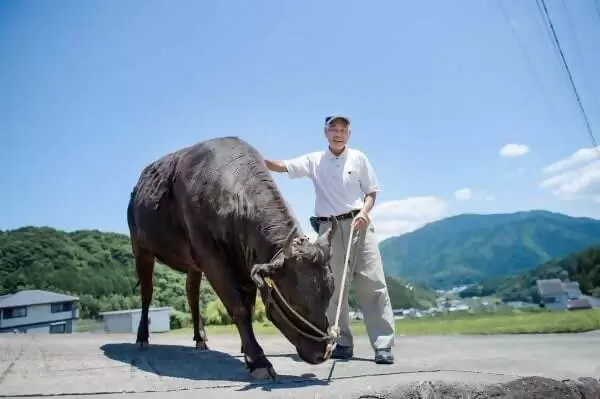Antique store Gugulab is part of a new wave of culture in rural Japan

Gugulab in Gujo Hachiman, Gifu Prefecture, is part of a new wave of culture in rural Japan.
A new breeze from an old country town
After more than a century of urbanization and industrialization, most young people from rural places still move and make their homes somewhere far from where they grew up. With the overall population decreasing, rural places feel emptier than ever before. Images associated with inaka, rurality, include grannies in old houses, rice fields, and summer festivals. It's thought to be a washed-over place, a bygone place.
Yet, things are starting to change.
One town, Gujo Hachiman in Gifu, Japan has allof the things you might associate with inaka. It has old homes and ricefields and grannies making vegetables. It even has a UNESCO worldheritage-listed summer dance festival where people dance for more than thirtynights in honor of their ancestors. The town has long attracted domestic tourists,but recently, international visitors have been drawn to the dancing and views.
But the town is also filled with an increasingnumber of young people who want to preserve local traditions and start new onesof their own. They might be from Gujo and return after working somewhere elseor move to Gujo because of the nature and local culture.
Yuya and Chikako Kasai
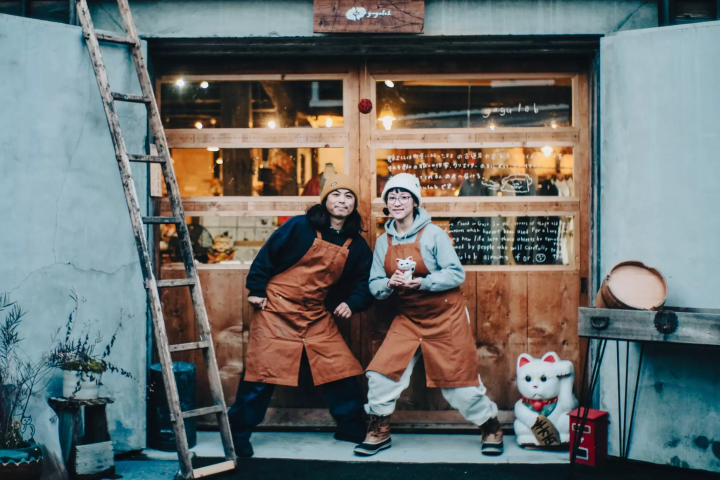
Yuya and Chikako Kasai are two such young people who started a new business together. Both arelocals to the Gujo area—Yuya grew up a couple of towns over, in Shirotori,while Chikako grew up in Gujo Hachiman.
Yuya is a photographer and videographer whostarted using cameras as a high school student shooting his friendssnowboarding on local slopes. He’s filmed everything from winter sports to carcommercials and continues to work both for businesses and at events in the townand further afield. Chikako is an illustrator and artist with a penchantfor strong lines and pops of colors. Since she was a kid, she has always drawn,and her work can be seen adorning labels of local businesses and on items soldin the pair’s store. She used to run her own gallery in an old machiyahouse in Gujo Hachiman.
The origin of Gugulab
Using their design and branding talent, andtheir love for their hometown, the two of them have created Gugulab, an antiquestore where they refurbish, upcycle, and reuse furniture and home goods foundin local homes. Gugulab was started in July 2022 after a visit to RebuildingCenter Japan, located in Suwa, Nagano. The original Rebuilding Center is anonprofit in Portland Oregon focused on environmental justice, reusingmaterials to reduce waste. Rebuilding Center Japan, located in a rural placewith a deep history just like Gujo, extends the focus on material reuse to theJapanese countryside, rescuing antiques and making old items usable in a newcontext. In a country where people routinely tear down houses less than onehundred years old and rebuild entirely anew, this focus on reusing old itemsout of environmental concern is pretty radical and totally necessary.
Kasai and Otsubo were inspired by their visit toRebuilding Center Japan. “I realized we could do this in Gujo,” said Kasai.Within a year of the visit, they opened their store in an old sake brewerylocated in the center of Gujo Hachiman. The store has become the centerpiece ofthe newly renovated brewery complex, which features stores including coffeeshops, a gallery, and restaurants, owned and run primarily by young locals. Thelocation and stores appeal to tourists as well as locals, and this complex ispart of a recent push to make tourism more beneficial for locals andsustainable in the long term.
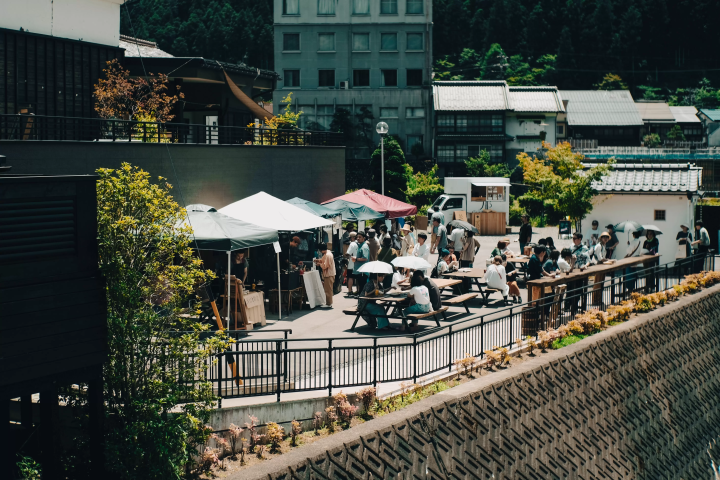
Upcycling local items
Gugulab gets its wares from the surroundinghomes in Gujo. Kasai fields calls and makes site visits, picking up everythingfrom plates and glassware, furniture, books, baskets, and more from localpeople, often elderly, who don't know what to do with things no one in theirfamily wants. Other times the callers might be people who just moved into anold home and need to get rid of perfectly good items they have no use for.Whoever the person, Kasai collects things that otherwise might have gone to thetrash.
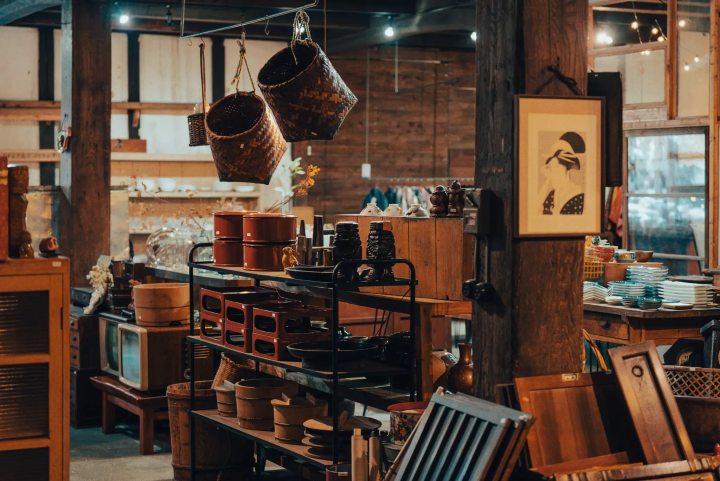
Because the items come from nearby homes,there’s a huge variety in the selection. Some things are large and expensiveantiques like tansu chests that are beloved all around the world. Otheritems, like cheap branded glasses or wooden boxes that have been heavily used,and therefore have a nice patina, are more prosaic and rarely seen in stores.
The items then are cleaned and sometimesupcycled or redesigned. Kasai and Otsubo might put new legs on chests, makingthem low tables, or print designs on boxes or other objects. All of a sudden, asimple wooden box or table becomes a new item and a stylish focal point for anentire room.
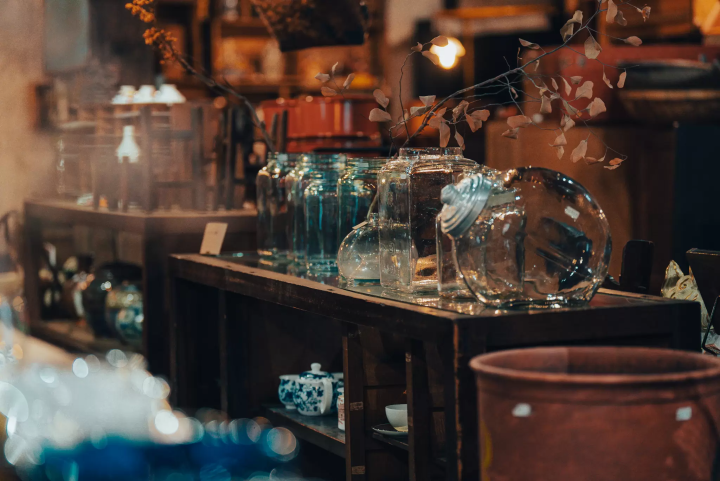
Otsubo also uses her design sense and art tocreate the branding for the store with handwritten signs and lots of art.Inside, it doesn't feel like an antique store as much as a stylish design storewith a young feel.
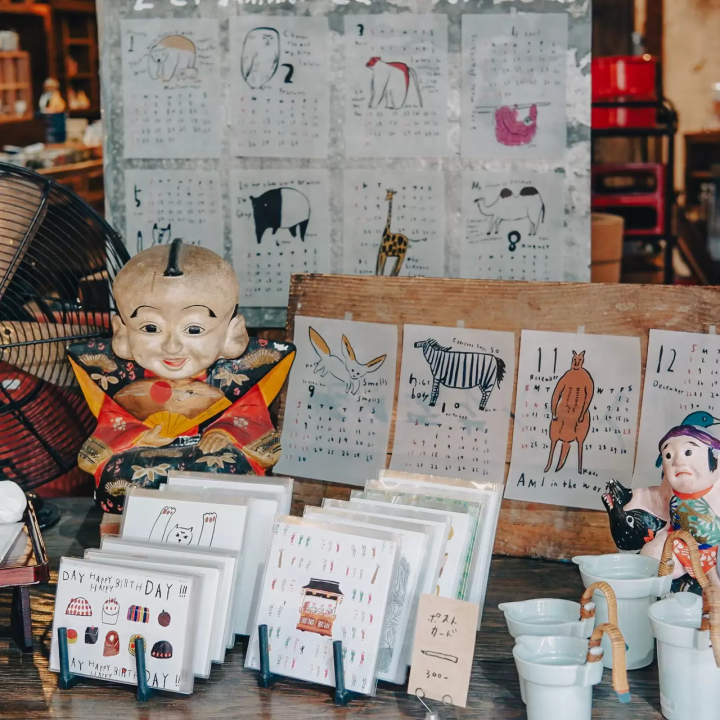
Gujo's future
The store also sells the work of local artists,basket makers, authors, and designers. Visitors can purchase anything fromtraditional fishing baskets to upcycled kimono fabric clothing to t-shirts with Chikako's illustrations that are seen all over town during the summer dancingseason. That community feel is the genius of the store. It’s clear that for the Kasais, the store is about creating a new type of local culture,featuring tradition but totally fresh, within their beloved town. The goal ofthe store is beyond even upcycling community antiques. The Kasais are creating a new community space. One where locals and visitors will want to keepcoming back.
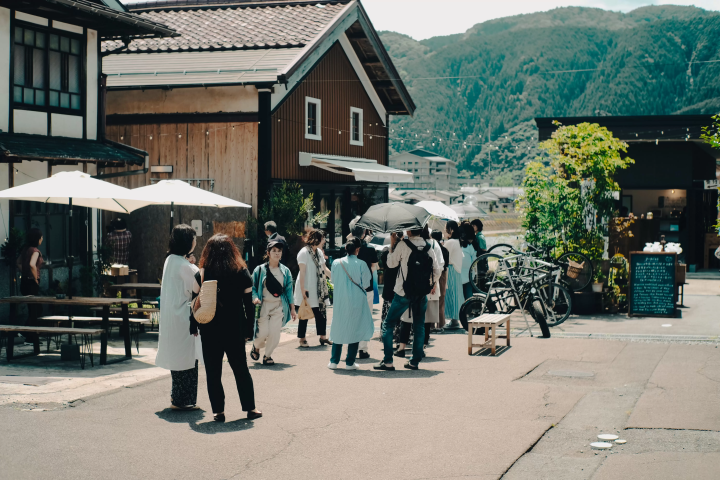
gugu lab is a shop that reuses and remakes folk crafts that remain in the area, located in Hachiman-cho, Gujo City, Gifu Prefecture, commonly known as “Gujo Hachiman”. First, I will introduce Gujo Hachiman. Gujo Hachiman is an old castle town surrounded by mountains, and the townscape with many historical buildings is also called Gifu's Little Kyoto. A beautiful river runs through the center of the town, and in the summer it is crowded with people fishing for sweetfish and children playing in the river. In addition, the “Gujo Odori”, which is registered as a UNESCO Intangible Cultural Heritage, is held from July to September, and anyone can participate. It has become a summer tradition in Gujo Hachiman, and everyone from small children to old people dance together in a circle to live songs. In recent years, new shops such as cafes and pastry shops have been opened one after another in renovated old buildings, making it a lively town. Our gugu lab just opened in 2022. We sell and remake furniture, tableware, kimonos, etc. collected from old houses in Gujo Hachiman. We also have a remake experience for foreign visitors, so please come and visit us!
The contents on this page may partially contain automatic translation.
































![[Recommended accommodation in Ureshino Onsen] 1.5 hours from Hakata Station! Enjoy Japanese tea and skin-beautifying hot springs at Saga Ureshino Onsen URESHINO YADOYA](https://resources.matcha-jp.com/resize/720x2000/2025/06/14-236549.webp)
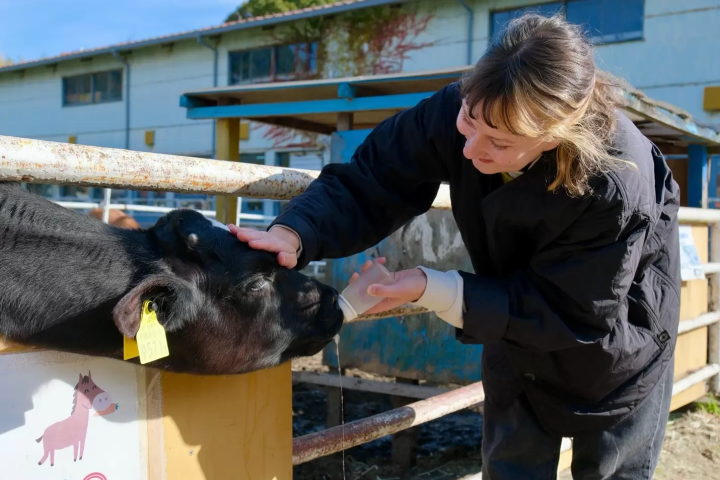

![[Kagoshima] Overcoming 12 Years of Hardship: Walking through Minamisatsuma City, the sacred land where the monk Ganjin landed](https://resources.matcha-jp.com/resize/720x2000/2026/02/21-259481.webp)
